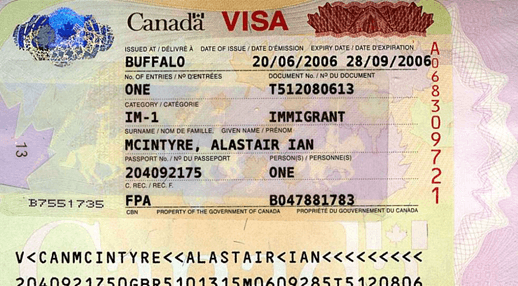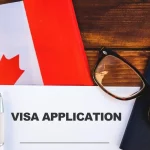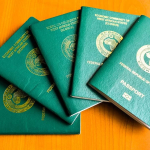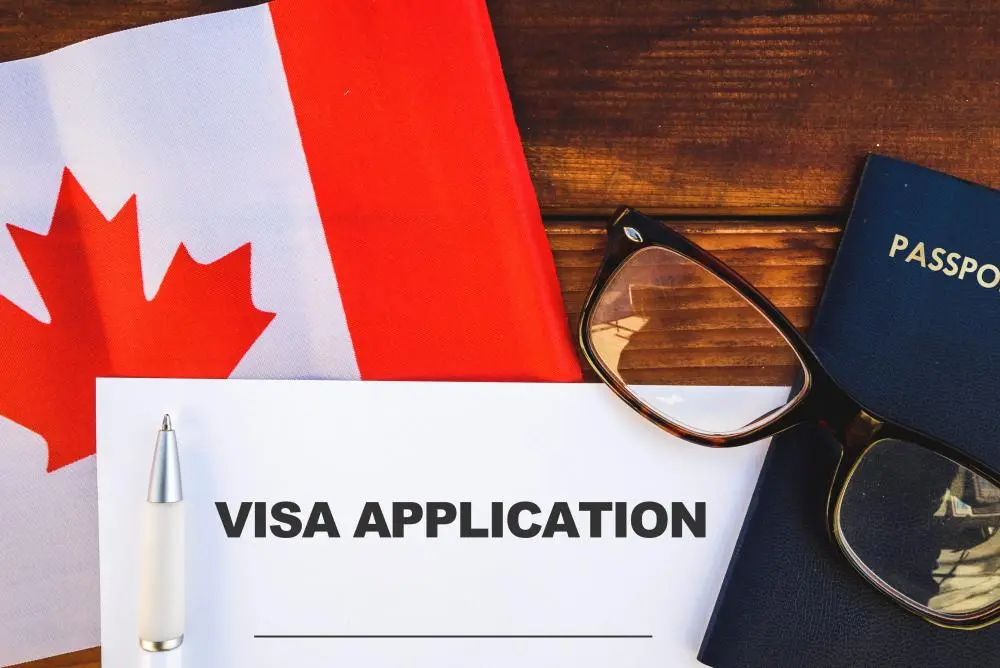If you want to leave Nigeria or “japa,” Canada is a better option for you. Canada is among one of the most highly developed countries in the world.
However, a document which is known as visa is a very vital document to have when considering travelling out to Canada. Hence in this article, I will be taking you through a complete guide to Canada visa application.
Table of Contents
What is a Visa?
A visa is a travel document that allows you to gain access to a foreign country for a specific period of time. You must apply for a visa before travelling, either at an embassy, consulate, or via online platforms. Sometimes you can obtain a visa on arrival. Visas are usually affixed onto your passport and state how long you can stay.
Importance of Visa
- A visa is a requirement for foreign nationals as a security measure
- To keep track of people who enter the country and to stop illegal immigration
- Visas are also used as a defensive effort, preventing insurgents from entering a country.
What Does a Visa Look Like?
A visa is a passport sticker with your name, picture, and the number of days you are permitted to stay in a particular nation.
Visas are occasionally issued separately from your passport and are not affixed to it, such as with electronic visas that you must print off.

Example of a Canada Visa
The term “visa” comes from the Modern Latin “charta visa,” which means “certified paper” or “paper that has to be viewed.” When travelling internationally in the past, visas were separate documents that were carried with the passport. However, today, the majority of visas come in the form of stamps or stickers that are affixed to your passport.
What is a Canada Visa?
Upon the definition of a visa above, a Canada visa is simply a visa that you obtain when travelling to Canada. It includes your name, picture, and the number of days you are permitted to stay in Canada.
Documents Needed for Canada Visa Application
For you to apply for a Canadian visa, you need the following documents
- Your Identification card.
- An appropriate application for a visa to Canada.
- A receipt for the Canada visa payments.
- Proof of a spotless criminal history.
- Proof of excellent health obtained by a medical examination.
- Photos that meet the criteria for photo submission for a visa to Canada.
- Evidence of financial capacity
- Evidence that after your Canadian visa expires, you’ll go back home.
- Documents proving identity and civil status.
- A letter of introduction outlining why you’re visiting Canada.
- Support letter/invitation to Canada.
These are the documents required of you when applying for a Canada visa. In addition, you must provide photocopies of your passport’s information page. They must include;
- Your passport numbers.
- The date of issue and expiry.
- Your personal information: name, photo, place of birth, and date of birth.
However, when applying for a Canada visa, the reason you are travelling to Canada should be considered to guide your application process, as there are different types of Canada visa applications.
Now, let’s look at the different types of Canada visas.
Read Also: Guide to Booking Flights in Nigeria
Types of Canada Visa
We have different types of Canada visas and they include;
- Temporary visa
- Permanent visa
Under each of these categories, there are various types
-
Temporary Canada visa
Canadian temporary visas come in the following varieties:
- Visa for travel to Canada: The holder of a visitor visa or tourist visa is permitted entry into Canada to travel there.
- Super visa for Canada: Parents or grandparents of Canadian citizens or Permanent Residents can travel to see their children or grandkids for an extended period thanks to the Canadian Super Visa.
- Official and diplomatic visas: Foreign officials and diplomats are permitted entry into Canada for business and official purposes with Diplomatic and Official visas.
- Welcome visa: Those persons who are deemed important due to their ranks and positions but do not qualify for a diplomatic or official visa are issued courtesy visas. Members of trade missions and diplomats travelling on official business are examples.
- Business visa for Canada: Individuals or groups of business travellers to Canada on official business are eligible for the Business Visa.
- Birth authorization for Canada: Those who meet all requirements to reside in Canada temporarily and who are pregnant and intend to give birth there are granted this visa. When a child is born in Canada, they are automatically citizens.
- Applying for an organ donor visa: A person coming to Canada to donate an organ to a Canadian citizen or permanent resident will be granted this visa.
- Visa for Canada Facilitation: Dual-national Canadian citizens who do not have a Canadian passport but do have a passport from another country are granted facilitation visas. Because of the great difficulties in obtaining a Canadian passport, the facilitation visa is stamped on the person’s other nationality visa.
- Student visa for Canada: Those who have been accepted to a Canadian university to complete their studies are granted a student visa for Canada. You can only obtain a Temporary Residence Visa (TRV) visa if you travel to Canada for less than six months of study. However, if you plan to stay for more than six months, you will require a Student Visa.
- Canada temporary work permit: Those with a job offer in Canada who want to work there for up to six months are granted temporary work visas. The applicant must meet the requirements for a temporary visa and produce a legitimate employment offer letter from an employer to obtain this visa.
- Permit for Temporary Residency: Those who need to travel to Canada for various reasons but are not otherwise eligible for a Temporary Residence Visa might do so with the help of this permission (TRV). Only the time the person needs to be in Canada is covered by this permit, such as two weeks for a workshop.
- Work permit for vacation: Young people from 30 different countries are granted the Canada Working Holiday Visa to visit and work there. Because it is a random selection visa, candidates must submit their applications and wait to be chosen randomly before applying for a work permit.
-
Permanent visas for Canada
The holders of permanent visas for Canada can live there indefinitely. They are also referred to as immigrant visas and come in a variety of forms, including the following:
- Program for immigration investors: The Immigrant Investor Program is for individuals with a net worth of at least $800,000CDN who intend to invest in the Canadian economy. Investors must put up a minimum of CAD$400,000, and the government will give them their money back interest-free after five years.
- Startup visa initiative: The Canada Startup Visa is intended for individuals who plan to actively participate in the economy. After three years of moving to Canada, they must promise to own and manage at least one-third of a Canadian company, generate and keep jobs, and have a net worth of at least $300,000.
- Visa for Self-Employed People: The Self-employed People visa is for those who can launch their own firms and have business, athletics, culture, or farming abilities. These individuals must demonstrate their capacity for financing the company and expertise in the relevant fields.
- Program for Specified Skilled Workers in Quebec (QSWP): You can apply for the Quebec Skilled Worker Program, which would allow you to move and work permanently in the Canadian province of Quebec if you have one of the necessary occupations and speak French fluently.
- Program for Family Sponsorship: The spouses and dependent children of Canadian citizens or Permanent Residents can immigrate to Canada permanently through the Family Sponsorship Visa program.
- Program for Live-in Caregivers (LCP): Caregivers qualified to care for the elderly, the disabled, or children and reside in a private home in Canada are granted this visa.
Other categories of visas include;
-
Express entry visa
The Canadian government created the automated immigration scheme known as Canada Fast Entry. Based on unique skills, it enables people from all over the world to apply for immigration to Canada.
They are included in this program:
- Government program for skilled traders (FSTP)
- Provincial Nomination Programs (PNP),
- Federal Skilled Worker Program (FSWP),
- Canadian Experience Class
Now having known the types of Canada visas, let’s talk about the process of application.
Read Also: A Complete Guide to US Visa Application in Nigeria
Canada Visa Application Process
The method for applying for a visa to Canada mostly relies on the type of visa you require. However, it is essential that you follow these easy procedures to apply for a visa to Canada:
- Find out if you qualify for a visa to Canada.
- Build a profile online.
- Put the document file together.
- Cover the costs.
- Wait for your Canadian visa to be processed.
- Passport and processing costs must be submitted.
-
Find out if you qualify for a visa to Canada
The Canadian government has made it quite simple to learn how to obtain a visa. They have developed various assessments that determine an applicant’s eligibility by having them respond to an online survey. You will be required to respond to a series of questions based on the type of visa you desire, and the system will then inform you if you are eligible to apply.
Also, it will offer you the necessary guidelines and directions you need to follow to meet all the requirements.
How Can I Use the Website of the Canadian Government?
- You must go to their website here to be able to access these surveys and determine your eligibility for the Canada visa. You can choose from a different tabs and information on the website, but you must select the Immigration tab.
- You will be presented with a drop-down menu of choices when you hover over or click on the Immigration tab. My application will be in the top tab, followed by tabs for Visit, Immigrate, Work, Study, and other options.
- Choose the option that best fits the type of visa you want to apply for. In keeping with the example we provided, you must select the Visit tab to obtain a tourist visa.
- You may find further details after selecting the option that corresponds to the purpose of your trip to Canada and the type of visa you wish to apply for. One of the options will state, “Find out if you can apply” or “Find out if you are eligible,” depending on which tab you have selected. Then, you click the link.
- You must complete a questionnaire after clicking the link, which will direct you there. Your personal information, the reasons you desire to visit Canada, and your past travel experiences are just a few examples. The system will display the findings after the questionnaire has been completed.
Three different types of results, each of which will mention one of the following, will be displayed for you:
- You are qualified for the visa that you have chosen.
- The algorithm will match you with a different visa if you qualify.
- You are not qualified to receive the visa.
- The system will ask you to enter your contact information (often your email), and they will give you a set of documents to determine whether you are qualified for the visa you have chosen or a different kind of visa.
- In addition to instructions and information on applying, the documents will include a visa description. They will also provide you with a reference code.
One of the most crucial pieces of information in that collection of documents is the reference code, which you must use to launch your application. You can’t apply until you have a referral code. Your reference code will have the type of visa you are asking for and will notify the system of the data you provided during your questionnaire.
You must therefore save both the email and those documents. The reference code may be written in various places, including on paper, your computer, or a piece of mail, but you must not misplace it. If you do, the questionnaire process will need to be started afresh.
-
Build a profile online
It will be made clear in the email instructions you get whether you must apply for a Canada visa in person or online. The Canadian government is digitizing its data, so most applicants must do so online. You must set up an account to accomplish that.
For the application, there are two ways to register an account:
- Establishing a Government of Canada login (GCKey)
- Use your online banking login since the Canadian government has partnerships with numerous banks.
You can choose whatever option best suits you since you must use your banking information to pay the visa fees.
-
Put the document file together
You can begin your application for a visa to Canada once you log into your account. Apply for the visa you have been approved for using your reference code. After entering the reference code, the system will display a list of the required papers for your Canadian visa application.
Visit this site for a comprehensive list of documents needed to apply for a visa to Canada.
Before applying, you must complete and submit each of these forms online.
-
Remit the fees
The system will direct you to the payment page once it has confirmed that you have provided all the required documentation. You must pay the Canada visa fees depending on the type of visa you seek. Your application will be submitted after that is done.
If you apply in person, you only need to take those documents to the Canadian Embassy in Nigeria. If you apply online, it will take about five working days to see the application on your account.
-
Wait for your Canadian visa to be processed
Depending on the type of visa you need, the Canadian Embassy will take two or more weeks to process your application. They might also request extra paperwork from you or ask for your biometric data and schedule an interview.
Even if you applied online, you would still need to visit the Embassy if they request your biometrics and schedule an interview. You must schedule an appointment in advance, or the Embassy will do so. You’ll be required to present your fingerprints and a photo at your appointment and respond to inquiries from a representative of the Canadian Embassy. View the Canada visa photo requirements.
The official will decide whether or not you qualify for a Canada visa. Immediately following your appointment, they can inform you of their choice or wait and send you a notification.
Even if you don’t need to provide biometric data or have an interview, you still need to regularly check your account because all notices from the Embassy on your visa will be placed there.
-
Passport and processing costs must be submitted
The next step is to deliver your passport to the Canadian Embassy in Nigeria if your application for a visa to Canada is approved. You can accomplish this by mailing it and processing costs to the Embassy’s address in Nigeria. The processing fees, which range from $20 to $50 {₦6,000 to ₦16,000} depending on the type of visa you’re applying for, must be paid by check or money order. A passport return envelope is an additional cost.
The embassy staff will receive your passport along with the necessary money, stamp your passport with the visa, and ship it back to you. You will need to pay the processing fees there and obtain the passport immediately if you are informed of their decision immediately following the visa interview.
Read Also: Factors to Consider Before Travelling Out of Nigeria (Japa)
- What happens after the approval of your Canadian visa application?
You can travel to Canada once you get your visa. You must present your documentation and passport at the point of admission. The authorities will examine them and inquire briefly about your purpose for visiting Canada.
They will decide whether or not to let you into the nation after you respond. If the officials at the border crossing feel you will conduct crimes or violate your visa limitations, they have the right to refuse admission into Canada. The only people who can determine whether or not you will enter Canada with a visa are border guards.
- The length of time it takes to obtain a visa for Canada
Each individual case has a different processing period for a Canada visa. It might take two to four weeks, maybe even longer.
Only when the Canadian authorities have received your complete application will your visa start to be processed. The processing period will be extended if they require you to obtain additional documentation for them.
Do you love the content you just read? Simply subscribe to our newsletter to keep track of more helpful posts. Cheers!
Canada Visa Application Fee
The cost of a Canada visa varies depending on what kind of visa you seek. Also, there are several fees you must pay, including processing fees and biometrics fees.
-
Canada visa temporary application fee
The usual visiting visa charge is $CAD100.
International travellers to Canada are issued temporary visas as part of the temporary residence payments. These cover the costs for Canadian student visas as well as tourist visas.
- Visa charge for visitors to Canada
Type of charge – per person, Visitor Visa Application Fee (including the Super Visa). (Visa for temporary residence with either one or several entries) Visa application fee of $100CAD for groups of five or more visitors. (Visa for temporary residence with either one or several entries)
You must apply jointly with your family members to be eligible for this price, and your kids must be younger than 22.
500 Visitor Stay Extension – $100 Per person
Return to guest status (Application fee not necessary) – $200
- Work permits Canada visa charge
The work permit Canada visa has different costs.
- Application Cost for a Work Permit – per person (Includes applications for extensions) – $155
- Work Permit Application Cost – a group of 3 or more performing artists. (Performing artists must apply at the same time and pay visitor visas individually, if applicable) – $465
- Open work permit cost $100
- Regain employment status – $355 (Comprises a $150 new work permit cost and a $200 price for status reinstatement).
- Study permits Canada visa charge
Fee for requesting a study permit per applicant (Including extensions)
- Restore your student status – $150 (Restoration of status is $200, and a new study permit for $150)
- Biometrics
If the Embassy requests you to submit your biometrics, they will be part of your Canada visa cost. The payments will cover the cost of a digital photo and the collection of fingerprints. Additionally, if you have submitted your application through a Visa Application Center (VAC), it will also cover the price of the core services of VAC, which include:
- Checking if the application is complete
- Sending application to the visa office
- Transferring passports and accompanying paperwork to and from the visa office;
- Tracking applications that are submitted online;
Types of fees $CAN
- Biometrics cost per person – $8
- Biometrics cost for families of 2 or more members – $170
- Biometrics fee for a group of 3 or more performing artists – $255
-
Permanent residence Canada visa fee charge
Fees that applicants must pay if they want to immigrate to Canada permanently are included in the category of permanent residence fees.
- Permanent residence permit fee (RPRF)
Most candidates must pay this amount once their application for permanent residence is accepted. If the Canadian government says you have to pay the cost, then you have to pay it.
If you withdraw your application or the Canadian government rejects it, you will receive a refund of this money, which is non-refundable.
The following people are exempted from the RPRF:
- Children who are dependent on the petitioner or major sponsor;
- Applications for sponsorship of adopted children;
- Requests for sponsorship of an orphaned brother, sister, nephew, niece, or grandchild.
- Protected persons, including those qualified due to their humanitarian or compassionate nature
- Convention Refugees
Fee
$490CAD for the right to permanent residence.
- Costs for Business Immigration
These fees are necessary for the following:
- Self-employed individuals
- Business immigration to Quebec
- Startup visas
Variety of fees $CAN
- The application fee for permanent residence is $1,540 (which includes the processing fee of $1,050 and the right to permanent residence fee of $490).
- The application cost for permanent residence (without right of permanent residence fee)$1,050
- Adding a spouse or common-law partner in the application fee of $1,040 ($550 for processing fees and $490 for rights to permanent residency included)
- Adding a spouse or common-law partner in the application fee (without right of permanent residence fee) – $550
- The application fee for dependent children is $150 per child.
- Fees for economic immigration
These fees are necessary for the following:
Pilot program for Atlantic immigration, caregivers, Canadian Experience Class, skilled federal workers, skilled workers from Quebec, provincial nominee, Express Entry.
Fee Type $CAD
- The application fee for economic immigration is $1,040 (which includes processing fees of $550 and $490 for rights to permanent residence).
- Application fee for economic immigration (without the right to permanent residency fee) – $550
- Application fee of 1,040 (includes processing price of $550 and right to permanent residency fee of $490) for applications involving a spouse or common-law relationship
- Adding a spouse or common-law partner in the application fee (without the right of permanent residence fee) – $550
- The application fee for dependent children is $150 per child.
-
Additional application costs for Canadian visas
Several Canadian visa application fees do not strictly fit in any of the kinds of fees that have been discussed thus far. They are listed below.
Fee Type $CDN
- 200 for a temporary resident permit
- Replacing or confirming an immigration document – $30
- Criminal reasons for refusal to admit – $200
- Serious crime grounds bar admission – $1,000
- Permission to go back to Canada – $400
- Participation cost for International Experience Canada $150
- Fee for employer compliance is $230
Conclusion
It is important to consider the reason you are travelling to Canada, the type of Canada visa you would like to obtain, the Canada visa you want to apply for and also the application fee of the Canada visa you are applying for.
Make sure you follow this guide religiously to avoid being a victim of scam.
Share your traveling experience with us in our Whatsapp Community. We would like to learn from you.
About Author
- Ebunoluwa Owoniyi is a student studying microbiology, a prospective graphics and fashion designer, she loves to write to enrich human knowledge.
Latest entries
 LifestyleFebruary 25, 2023A Complete Guide to Canada Visa Application in Nigeria
LifestyleFebruary 25, 2023A Complete Guide to Canada Visa Application in Nigeria LifestyleJanuary 27, 2023How to Apply for an International Passport in Nigeria
LifestyleJanuary 27, 2023How to Apply for an International Passport in Nigeria Business InsightsNovember 23, 2022How to Use Pay Per Click Advertising on Your Website
Business InsightsNovember 23, 2022How to Use Pay Per Click Advertising on Your Website EntrepreneurOctober 25, 2022Top 10 Digital Marketing Tools To Help Grow Your Business
EntrepreneurOctober 25, 2022Top 10 Digital Marketing Tools To Help Grow Your Business

